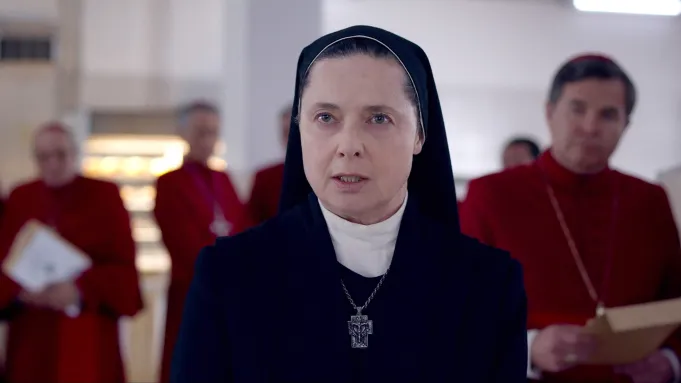Conclave 2024: Faith, Power, and the Fractures Beneath
- Written by Mx. Varsha

- Dec 7, 2024
- 4 min read
Conclave, 2024 is an unapologetic disruption—a scalpel, peeling back centuries of ritual and power to expose the festering wounds beneath. For someone like me—queer, trans, and relentlessly skeptical of anything cloaked in moral superiority—it felt like a fever dream wrapped in silk robes and incense.

The premise is deceptively simple: the Pope is dead, and the cardinals descend like scavengers. Their robes flutter dramatically, their hands fold in feigned reverence, but their eyes burn with ambition. What unfolds isn’t a spiritual deliberation but a brutal power play—a chess match fought in whispers, shadowed glances, and veiled threats. Meanwhile, the women in the film, though few, stride through this dense labyrinth like beams of unflinching light, their truths cutting as sharply as a blade slicing through sacramental bread.
The cardinals skulk in dark corners, whispering and scheming like puppeteers pulling invisible strings. The Church’s misogyny is baked into every shadow, every corridor, and the film doesn’t shy away from it. The Vatican isn’t a sacred fortress; it’s a labyrinth of suffocating corridors, a place where piety is weaponized, and silence is a currency. It mirrors modern political systems, where institutions built on promises of unity fracture under the weight of their hypocrisies. These are men playing God, but Conclave exposes their fallibility in every breath, every unspoken thought.
SPOILERS AHEAD


Ralph Fiennes as Cardinal Lawrence is a study in tension. His breathing—laboured, heavy—becomes its own kind of prayer, a reminder that faith and doubt are inextricably linked. Felt like a metaphor for every moment I spent wrestling with faith in my youth. Raised without religion but desperate for meaning, I turned to scripture after scripture, only to find the same rot: politics masquerading as divinity, power wrapped in sacred cloth. Fiennes captures that disillusionment—the weight of carrying a faith you’re not sure you even want.
And then there’s Isabella Rossellini, whose presence electrifies the screen. Her curtsy—a deliberate, almost insolent gesture—speaks volumes. Without needing pages of dialogue, she commands attention, a force unto herself, reminding us of the power in stillness and subtlety. While Conclave dissects the Church’s patriarchal grip with surgical precision, its feminist undertones shine through in the quiet defiance of characters like Rossellini’s Sister Agnes—a piercing reminder of the resilience and strength of those so often rendered invisible.

Stanley Tucci, meanwhile, is all charm and sharp edges as Cardinal Bellini. Every line he delivers feels like it’s wrapped in velvet but hiding a dagger. There’s a slyness to him, an effortless wit that had me hooked on every syllable. His casual brilliance—a quick drop of “temerity” here, a smirk there—brought levity to the otherwise heavy, oppressive tone. If charisma were a sacrament, Tucci’s Bellini would be canonized.

Director Edward Berger’s vision is hauntingly precise. The black-and-red palette doesn’t just nod to the Church’s history of martyrdom and violence; it saturates every frame with an almost unbearable weight. The Vatican feels like a haunted house, its ghosts not supernatural but systemic.
The sound design—clicking pens, groaning doors, the quiet rustle of robes—builds a tension so palpable it’s practically liturgical. The sound design is anxiety-inducing in the best way—the click of a pen, the groan of ancient doors, the deafening silence before a prayer. Even mundane sounds like coffee makers, door handles, copy machines, and broken seals leave a huge impact. And the Church’s obsession with spectacle, its elaborate costumes and rituals, feels almost theatrical—like drag, performative to the core. The dialogue, too, is razor-sharp.
What Conclave refuses to do—thankfully—is hand-hold its audience. It’s dense, demanding you wrestle with its themes. From the start, it’s clear that this isn’t about proving or disproving God. It’s about power, its limits, and who gets to wield it. “The Pope never doubted God,” Tucci’s Bellini remarks, “but he lost faith in the Church.” That line felt like a dagger in the heart of centuries-old dogma.
And yet, despite the film’s solemn tone, there’s humor in its sharp critique of religious hierarchy. The cardinals, for all their grandeur, are laid bare as flawed men, clinging to power with petty squabbles and covert glances. Their humanity peeks through in the smallest, most mundane moments—a flicker of a candle, the rustle of a robe, or even scrolling through photos on their phones between deliberations.

But let’s talk about Cardinal Benitez, portrayed by Carlos Diehz. The sermon Benitez delivers to the cardinals—petty men clawing at power, wrapped in their own self-importance—is pure poetry. The reveal of Benitez as an intersex character ascending to the papacy was radical in every sense of the word. “I am as God made me,” he says, and in that moment, and in that moment, centuries of rigid theology unravel.
To see an intersex character in such a pivotal rolelike lietrally the apex of the Church’s hierarchy—especially in a story steeped in tradition and rigid binaries—felt like a seismic shift. The film not only subverts traditional power dynamics but also compels a reexamination of leadership itself: who holds power, and why it is so often reserved for men. And honestly, I can’t think of another film where an intersex character speaks so openly about their medical choices—or even exists with this level of dignity and nuance. In a world drowning in anti-trans and anti-intersex legislation, Benitez felt like a a quiet but powerful rebellion against a tide of erasure.

In the end, Conclave isn’t about faith or disbelief. It’s about systems and the cracks that run through them. It’s about the weight of legacy and the bravery of questioning it. It’s a mirror held up to power, reflecting its frailty and its humanity. It’s messy, it’s unrelenting, and we are here for it.
Disclaimer:
All images used in this post are sourced from the internet and used solely for educational and commentary purposes. They remain the property of their rightful owners. The opinions? Purely ours. And shared to inspire thoughtful conversation.




















